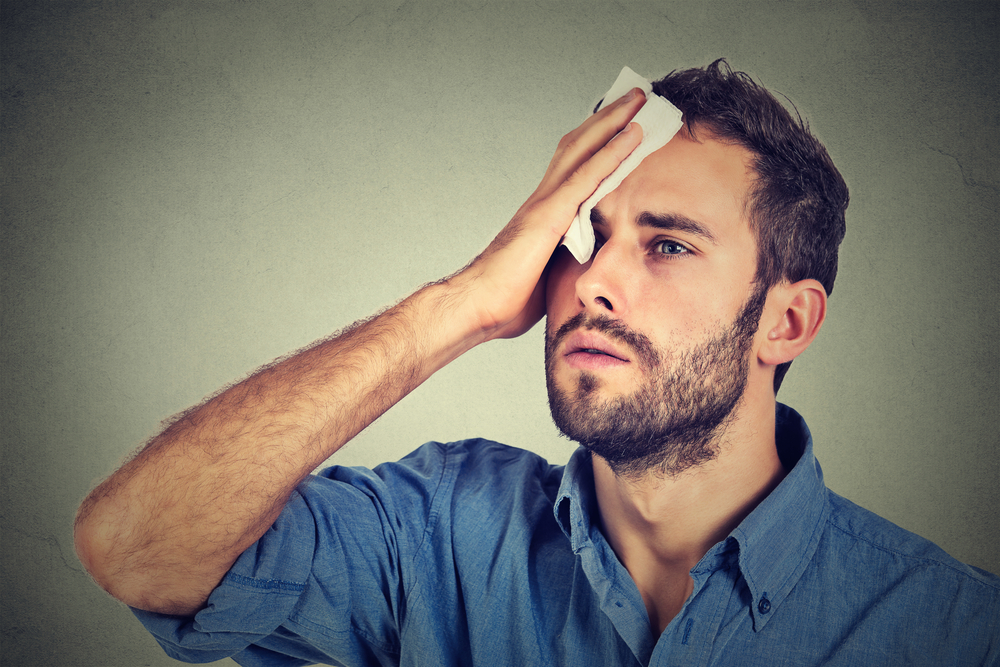Excessive sweating, or hyperhidrosis, is a frustrating challenge for many patients worldwide. Whether it’s a mild annoyance or something that significantly impacts your daily life, our team at Worcester Dermatology in Worcester, MA, are here to help you better understand this condition.
What Causes Excessive Sweating?
Anxiety
There can be various causes behind excessive sweating, and sometimes the cause is unknown. That said, sometimes hyperhidrosis can be tied to anxiety. If you notice yourself sweating more frequently during times of stress, your stress could be the culprit. If that’s the case, the sweat is a symptom and a multi-faceted treatment may be the best approach.
When anxiety causes sweat, patients can find themselves in a vicious cycle. The idea of sweating and being embarrassed may make them more anxious, which could increase the likelihood of them sweating. In that case, managing the hyperhidrosis may improve the patient’s anxiety levels, while addressing the anxiety itself may also make the patient less likely to sweat during stressful situations.
Age-Related Changes
Sweat production can increase during times of hormonal shifts. Teenagers may find themselves sweating more than they used to as their sweat glands grow and develop. Patients going through menopause can also start sweating more easily and go through periods of heavy sweating due to hormonal changes and “hot flashes.”
Excessive Sweating As a Secondary Condition
Hyperhidrosis can be primary or secondary. Secondary hyperhidrosis would include sweating that’s caused by another condition, like menopause. Secondary hyperhidrosis usually affects the whole body instead of a specific area.
Sometimes the cause behind excessive sweat isn’t well understood, but there are some common conditions that are known to increase sweat levels.
Diabetes
A person with diabetes may begin to sweat when they’re experiencing low blood sugar.
Gout
Gout is known to cause hyperhidrosis. If the onset of your hyperhidrosis symptoms correlates with a gout diagnosis, that could be a sign that your hyperhidrosis is a secondary condition.
Nerve Damage or Head Trauma
Some forms of nerve damage or head trauma may affect your body’s ability to regulate sweat production.
Frostbite
Frostbite can cause permanent damage to the body, including temperature sensitivity and an increased likelihood of developing hyperhidrosis.
Obesity
Carrying extra weight means the body has to work harder during physical activities, making patients who struggle with obesity more likely to get easily overheated.
Hyperthyroidism
Patients with hyperthyroidism are often more sensitive to heat when compared to patients who have a properly functioning thyroid.
Tumors
Some types of tumors or cancers can contribute to night sweats in particular. That doesn’t mean everyone who struggles with night sweats has cancer, but if you’re concerned about your symptoms it’s never a bad idea to get checked out, even if it’s for peace of mind.
Excessive Sweating as a Primary Condition
This can also be called primary focal hyperhidrosis. If you’re struggling with hyperhidrosis as a primary condition, you’re likely to have developed it early on in life. Primary hyperhidrosis is more likely to affect specific areas of the body, rather than the whole body at once. Primary hyperhidrosis is also less likely to cause night sweats when compared to secondary hyperhidrosis.
The areas most commonly affected by primary hyperhidrosis can include:
- Under your arms
- The hands
- The feet
- Your forehead
Our Treatments
For Secondary Hyperhidrosis
Since secondary hyperhidrosis is caused by something else, the most effective treatment for it is to treat the underlying cause. That said, in some cases treating sweat in certain areas could be helpful as you’re looking into tackling the root of the problem.
If you have secondary hyperhidrosis, feel free to reach out to our team of experts. We can offer advice and let you know if one of our treatments may be able to help you manage your symptoms.
For Primary Hyperhidrosis
Botox
Botox is well known for its ability to help manage your sweat levels. The best part is it can do this without any need for surgery or downtime. This treatment is often used for cosmetic reasons since it blocks certain nerve signals and helps relax and smooth out the face. That same ability is what makes it useful for reducing sweat production.
Botox interrupts the signal that tells your sweat glands to produce sweat. Since primary hyperhidrosis usually affects one or several specific areas, you can treat these localized areas so they no longer produce sweat. Only the treated areas will be affected. The rest of your body will still be able to sweat, so you don’t have to worry about your body being able to regulate its temperature.
How Long Do Botox Results Last?
Botox can offer relief from excessive sweat production for up to seven months. If you’re happy with your results, setting up a consistent treatment schedule can help you maintain them.
MiraDry
Another one of our treatment options is miraDry. This treatment can be a great option for patients who are looking for a permanent solution to their localized sweating. This treatment delivers electromagnetic energy to the underarms. The sweat glands will absorb this energy as heat, which will disable the glands.
Our Team Can Help Improve Your Comfort Levels
During a consultation, we can go over your condition. That will help us know which of our treatments may be the right fit for your needs. Reach out to us today at Worcester Dermatology in Worcester, MA, to set up your consultation! With a second location at Chelmsford, MA, as well, our friendly staff is ready to team up with you and help improve your comfort levels.
